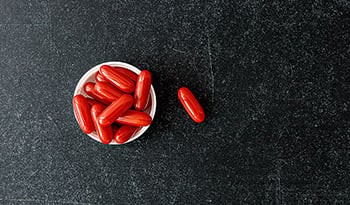Feeling Fatigued? 5 Supplements For a Natural Boost of Energy
DISCLAIMER:This blog does not intend to provide diagnosis...
- In this article:
- 9 Common Symptoms of Fatigue
- Caffeine versus Green Tea (L-theanine and Caffeine Combination)
- Coenzyme Q10 with NADH
- Vitamin B12
- Iron
- Ashwagandha

When you're feeling overwhelmed, persistent fatigue can often block your experience of joy. Fatigue is a commonly reported symptom and can interfere with daily functions and overall well-being. Whether you want to find the motivation to sweat, the energy to tackle a complex work project, a smooth way to face a rigorous day, or even just a persistent harmony, taking supplements that support energy production can be a game-changer.
9 Common Symptoms of Fatigue
Fatigue happens to be one of the hardest symptoms for scientists and clinicians to measure because feeling exceptionally tired stems from mental, physical, and emotional burdens. Here are the common symptoms reported in conjunction with fatigue and used in various scaling systems in research, such as the Fatigue Severity Scale.
- Weakness
- Needing to rest more
- Difficulty concentrating
- Memory concerns
- Lower motivation levels
- Increased physical aches and pains
- Feeling tired during and after exercise
- Trouble completing duties and responsibilities
- Associated feelings of being down, tired but anxious (restless), and even depressed
Depending on how you experience fatigue and where it most negatively impacts your life, research shows that certain supplements will help you find more consistent energy. Combining supplement use with the right lifestyle measures, such as getting a full night's sleep and eating a clean diet, could help boost energy levels.
Common energy boosters such as guarana, taurine, caffeine, and sugar, provide a short-lived burst, but these are usually followed by a “crash and burn.” This rapid up-and-down cycle can deplete your energy stores and leave you with worsening fatigue.
It is much wiser and rewarding to focus on a few key supplements backed by reliable clinical data showing improvement in cellular energy and measures of fatigue.
Here are five main players in the energy-boosting game.
Caffeine versus Green Tea (L-theanine and Caffeine Combination)
The well-known and widely used stimulant caffeine is ingested by the majority of the world as coffee, tea, or soft drinks. Research shows caffeine improves mental alertness and increases physical activity. However, most people also know that overconsumption of caffeine can include side effects, such as irritability, anxiety, heart palpitations, increased blood pressure, and rebound fatigue. The ongoing question is, “Does caffeine help or harm our general health?”
Green tea naturally provides caffeine and the added benefit of another compound called L‑theanine. In research, participants who take a combination supplement of L‑theanine and caffeine show improved energy levels with a significantly lower risk of unwanted side effects.
L-theanine is a well-tolerated bioflavonoid (antioxidant) that is associated with relaxation but not drowsiness. L‑theanine lowers the stress response in the body by balancing cortisol levels (a stress hormone), and balanced cortisol levels promote sustained energy.
In contrast to L‑theanine’s association with lower cortisol fluctuations, a study with young males ingesting high-dose caffeine alone (600 mg) shows a direct spike in cortisol levels, a direct stress response. When the young male adults received a low dose of caffeine, cortisol levels did not spike directly after ingestion.
The US Food and Drug Administration has cited the maximum recommended dose of caffeine as 400 mg daily, about 4–5 cups of coffee. Though this dose is considered safe for most people, it is linked to post-exercise fatigue and decreased post-exercise cellular ventilation.
A daily dose of 1–2 cups of coffee or tea a day seems to be a better long-term choice for energy. In a study of middle-aged women, this amount of daily caffeine intake led to a sustained increase in physical activity to a moderate level of intensity. The combination of L-theanine and caffeine may also increase focus for complex tasks. Study participants given 97 mg of L-theanine in combination with only 40 mg of caffeine reported increased alertness and demonstrated increased cognitive function skills when tested. Another study with women given caffeine mixed with flavonoids (including L-theanine) showed a significant improvement in metabolism, fat burn, and exercise expenditure compared to placebo.
The take-home message is green tea seems to be superior to other caffeinated drinks by promoting the type of mental and physical energy boost we desire without negatively affecting energy stores or inducing a stress response. If you do not care for sipping tea, L‑theanine with caffeine supplements are comparable.
Coenzyme Q10 with NADH
The nutrient coenzyme Q10 (CoQ10) plays an important role in protecting and supporting our mitochondria. In the past few years, with more press about mitochondrial disease, the enzyme is becoming more known and utilized in supplement form.
Mitochondria are the essential powerhouses of cellular energy production. In cells that expend a lot of energy, such as muscle and brain tissue, we house thousands to millions of mitochondria in each cell. Even though we rely on them for energy production, they are extremely fragile. CoQ10 becomes the superhero by protecting the mitochondria from oxidative damage.
CoQ10 is present in every cell. Its other name, ubiquinone, is fitting because it is ubiquitous. As we get older, our CoQ10 levels gradually decline, making it difficult to reach the maximum energy level of youth. This decline may contribute to fatigue, especially if people do not consume foods, such as fish, meat, and nuts, with adequate CoQ10 levels.
People at significant risk of CoQ10 deficiency include those diagnosed with heart failure or type 2 diabetes or prescribed a class of drugs called statins for high cholesterol. Though research shows that CoQ10 supplementation is less likely to increase energy in those with adequate levels, studies do show that the supplements are still safe.
Both CoQ10 and NADH (nicotinamide adenine dinucleotide [NAD] + hydrogen [H]) play a critical role in mitochondrial adenosine triphosphate (ATP) production. ATP is the energy molecule of a cell, also called “energy currency.” In a study review, participants with chronic fatigue syndrome and fibromyalgia given CoQ10 with NADH showed a significant improvement in fatigue based on a reduction in a fatigue impact scale.
The CoQ10 average supplement dose is 30 to 90 mg per day, with 200 mg per day commonly recommended if deficiency is suspected. Because of its fat-soluble properties, maximum absorption occurs with foods containing healthy fat.
Vitamin B12
Vitamin B12 is an essential vitamin required to make red blood cells and DNA. Deficiency often manifests in the nervous system and the blood with symptoms of generalized weakness and fatigue.
Vitamin B12 functions as an essential part of a complex enzyme pathway that ultimately leads to various types of energy production. Vitamin B12 deficiency occurs from poor absorption, low consumption, or the presence of a genetic defect that blocks the pathway needed to utilize the active form of B12.
With increasing numbers of people choosing vegan and vegetarian diets, vitamin B12 deficiency may be even more prevalent. Most food sources of vitamin B12 that are adequately absorbed and utilized come from animal proteins and animal fats.
If you feel you are deficient in this B vitamin, it is important to supplement with the right form for your body. As the field of genomics grows, we are discovering that a significant amount of the population has a genetic defect, the MTHFR mutation defect, which blocks utilization of the active form of vitamin B12.
With this genetic variant, caution should be taken to supplement only with the form that can be utilized. No matter if you have the variant or not, the adenosylcobalamin is most likely to be utilized; however, the majority of the population tolerates methylcobalamin as well. The synthetic form of vitamin B12, cyanocobalamin, is not helpful to some and may be harmful to those with certain genetic mutations.
Iron
Essentially, iron supports our cells by helping to form hemoglobin, a protein in our red blood cells that transports oxygen from the lungs to all the other organs of the body. Optimal levels of iron stores provide optimal oxygenation levels, and oxygenation improves energy.
Certain key groups are at increased risk of iron deficiency due to poor iron intake, blood loss, or physiologic states of increased iron requirements including:
- Menstruating women
- Vegans and vegetarians
- Pregnant women
- Anyone experiencing blood loss or frequent blood donations
If you have ever been iron-deficient, you have likely experienced fatigue that greatly improves after proper supplementation (guided by a medical provider).
However, additional iron is not good for everyone and can cause harm. Iron should be taken only after confirming the presence of iron deficiency anemia with simple blood tests. Those who continue to supplement at high doses when not warranted develop iron overload characterized by symptoms of joint pain, abdominal pain, darkening of the skin, and chronic fatigue. Observational studies suggest that a high intake of heme iron may increase the risk of colon cancer.
Certain types of iron are difficult to absorb and may cause nausea and abdominal pain, especially when taken on an empty stomach. Recommended forms include ferrochel iron or ferrous gluconate. To significantly enhance iron absorption, take your supplement with a meal that includes vitamin C-rich foods such as red peppers.
Ashwagandha
Ashwagandha is an herb respected and used in Ayurvedic medicine for centuries as a tonic to lower the negative impact of physical and mental stress. Conventional research also shows ashwagandha significantly improves measures of stress and fatigue.
Classified in ancient Chinese and Ayurvedic medicine as an adaptogen, this unique herb can help the body use its own healing properties to balance the response to a stress trigger. Stress, or any level of mental or emotional strain or tension, can lead to underperformance and adverse clinical conditions. Most report increased fatigue when experiencing any level of increased stress.
In a double-blinded, placebo-controlled trial, the most respected form of study, “high-concentration full-spectrum ashwagandha root extract safely and effectively improved an individual's resistance towards stress and thereby improves self-assessed quality of life.” The pertinent finding showed that ashwagandha in supplement form may combat stress before it causes undue fatigue.
In summary, we all welcome a little help strengthening our resilience during stress-inducing times, so consider these five supplements for your individual energy needs. Because when we don’t have good rest, vitamin-packed meals, and time to sweat out our frustrations, having additional energy-boosting solutions at hand may be helpful.
References:
- Neuberger, G.; Measures of fatigue: The Fatigue Questionnaire, Fatigue Severity Scale, Multidimensional Assessment of Fatigue Scale, and Short Form‐36 Vitality (Energy/Fatigue) Subscale of the Short Form Health Survey. Arthritis Care & Research. doi: 10.1002/art.1140530. Epub 2003 Oct 30.
- Koivusilta L., Kuoppamäki H., Rimpelä A; Energy drink consumption, health complaints and late bedtime among young adolescents. Int J Public Health, 2016. 61(3): p. 299-306.
- Giles G.E., Mahoney C.R., Brunyé T.T.; Caffeine and theanine exert opposite effects on attention under emotional arousal. Can J Physiol Pharmacol, 2017. 95(1): p. 93-100.
- Türközü D., Şanlier N.; L-theanine, unique amino acid of tea, and its metabolism, health effects, and safety. Crit Rev Food Sci Nutr, 2017. 57(8): p. 1681-87.
- Wu B.H.; Dose effects of caffeine ingestion on acute hormonal responses to resistance exercise. J Sports Med Phys Fitness, 2015. 55(10): p. 1242-51
- Fernández-Elías V.E., Del Coso J., Hamouti N.; Ingestion of a moderately high caffeine dose before exercise increases postexercise energy expenditure. Int J Sport Nutr Exerc Metab, 2015. 25(1): p. 46-53.
- Torquati L., Peeters G., Brown W.J., Skinner T.L.; A daily cup of tea or coffee may keep you moving: association between tea and coffee consumption and physical activity. Int J Environ Res Public Health, 2018. 15(9). p. 1812
- Giesbrecht, T., Rycroft, J.A., Rowson, M.J., De Bruin, E.A.; The combination of L-theanine and caffeine improves cognitive performance and increases subjective alertness, Nutritional Neuroscience, 2010. 13(6): p. 283-90.
- Nieman D.C., Simonson A., Sakaguchi C.A., et al.; Acute ingestion of a mixed flavonoid and caffeine supplement increases energy expenditure and fat oxidation in adult women: a randomized, crossover clinical trial. Nutrients, 2019. 11(11): p. 2665. doi: 10.3390/nu11112665. Epub 2019 Nov 5.
- Saini R.; Coenzyme Q10: The essential nutrient. J Pharm Bioallied Sci, 2011. 3(3): p. 466-67.
- Cocchi M.N., Giberson B., Berg K., et al.; Coenzyme Q10 levels are low and associated with increased mortality in post-cardiac arrest patients. Resuscitation, 2012. 83(8): p. 991-95.
- Suksomboon N., Poolsup N., Juanak N.; Effects of coenzyme Q10 supplementation on metabolic profile in diabetes: a systematic review and meta-analysis. J Clin Pharm Ther, 2015. 40(4): p. 413-18.
- Banach M., Serban C., Sahebkar A., et al.; Lipid and blood-pressure meta-analysis collaboration group. effects of coenzyme Q10 on statin-induced myopathy: a meta-analysis of randomized controlled trials. Mayo Clin Proc, 2015. 90(1): p. 24-34.
- Hidaka T., Fujii K., Funahashi I.; Safety assessment of coenzyme Q10 (CoQ10). Biofactors, 2008. 32(1-4): p. 199-208. Review.
- Castro-Marrero J., Cordero M.D., Segundo M.J., et al.; Does oral coenzyme Q10 plus NADH supplementation improve fatigue and biochemical parameters in chronic fatigue syndrome? Antioxid Redox Signal, 2015. 22(8): p. 679-85.
- Bonora M., Patergnani S., Rimessi A., et al.; ATP synthesis and storage. Purinergic Signal, 2012. 8(3): p. 343-57.
- Office of Dietary Supplements, National Institutes of Health; Vitamin B12 Fact Sheet for Health Professionals. National Institutes of Health Website; Updated 2020 Mar 30; Accessed 4/27/20
- Kozyraki R., Cases O.; Vitamin B12 absorption: mammalian physiology and acquired and inherited disorders. Biochimie, 2013. 95(5): p. 1002-7.
- Simonson W.; Vitamin B12 deficiency: detection and treatment considerations. Geriatr Nurs, 2018. 39(4): p. 477-78.
- Rizzo G., Laganà A.S., Rapisarda A.M., et al.; Vitamin B12 among vegetarians: status, assessment and supplementation. Nutrients, 2016. 8(12):767.
- Wan L., Li Y., Zhang Z., et al.; Methylenetetrahydrofolate reductase and psychiatric diseases. Transl Psychiatry, 2018. doi: 10.1038/s41398-018-0276-6. Epub 2018 Nov 5.
- Shiran A., Remer E., Asmer I.; Association of vitamin B12 deficiency with homozygosity of the TT MTHFR C677T genotype, hyperhomocysteinemia, and endothelial cell dysfunction. Isr Med Assoc J, 2015. 17(5): p. 288–92.
- Al-Batayneh K.M., Zoubi M.S.A., Shehab M. Association between MTHFR 677C>T polymorphism and vitamin B12 deficiency: a case-control study. J Med Biochem, 2018. 37(2): p. 141–47.
- Johnson-Wimbley T.D., Graham D.Y. Diagnosis and management of iron deficiency anemia in the 21st century. Therap Adv Gastroenterol, 2011. 4(3): p 177–84.
- Miller J.L.; Iron deficiency anemia: a common and curable disease. Cold Spring Harb Perspect Med, 2013. 3(7). doi: 10.1101/cshperspect.a011866. Epub 2013 Jul 1.
- Qiao L., Feng Y.; Intakes of heme iron and zinc and colorectal cancer incidence: a meta-analysis of prospective studies. Cancer Causes Control, 2013. 24(6): p. 1175-83.
- Singh N., Bhalla M., de Jager P., Gilca M.; An overview on ashwagandha: a Rasayana (rejuvenator) of Ayurveda. Afr J Tradit Complement Altern Med, 2011. 8(5 Suppl): p. 208–13.
- Chandrasekhar K., Kapoor J., Anishetty S.; A prospective, randomized double-blind, placebo-controlled study of safety and efficacy of a high-concentration full-spectrum extract of ashwagandha root in reducing stress and anxiety in adults. Indian J Psychol Med, 2012. 34(3): p. 255-62.

 By Dr. Nicole Craven, M.D.
By Dr. Nicole Craven, M.D.


